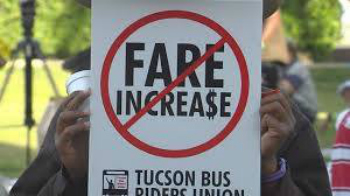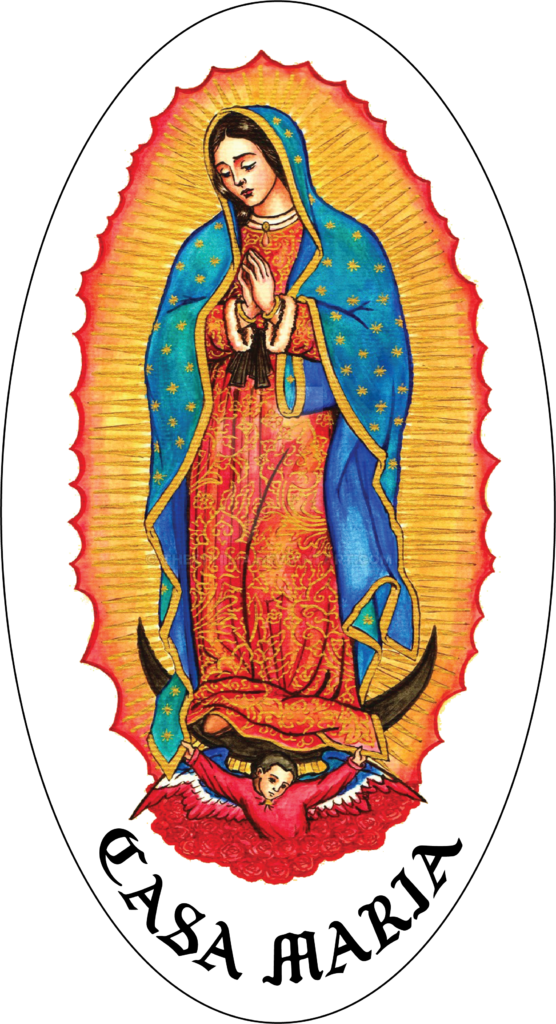
By Sarah Launius, PhD Candidate in the School of Geography and Development at the UA
No doubt you know already that the Mayor and Council are looking to raise fares for bus and streetcar riders. The different proposals put forward each place a heavy burden on different types of riders. Although the city claims they do not want to have to reduce service, make transit less accessible to current and potential riders, or increase fares (all of which are debatable) the message is clear: The City Council does not want to pay for transit out of the city’s general fund. Or another way to think of it is they want more of the cost to be covered by riders as opposed to the general fund.
There’s a few ideas implied in this thinking that we should parse out. The first is whether transit is a necessary public service akin to parks, roads, schools and first responders. Arguably, it should be. Further, transit in the U.S. is overwhelmingly supported by local, state and the federal government. Second, while we can wish that transit costs were covered more by riders, most riders have not seen an increase in wages, so is it really fair to expect these same riders to bear more of the costs? Third, just as the city has taken steps to encourage rain harvesting we must understand that incentivizing transit is an important quality-of-life and climate justice issue in our desert town. As Councilor Cunningham recently shared in his newsletter:
Our climate is changing, and it is caused by human activity. Six billion people on the planet is going to have an impact. In fact, our region is experiencing some of the most pronounced changes in the lower 48 states. Between 1976 and 2005 we had an increase of average annual temperature of 2.5 degrees. This is more than twice the global average for the same period of time. The desert southwest is expected to experience a further increase in temperature of 5 to 8 degrees by the end of the century given no reductions in greenhouse gas emissions. These shifts are expected to be greater in the summer than the winter… To accommodate our cars with wider roads or parking lots we lay down miles of asphalt. An estimate I’ve seen is that a quarter of our city’s land area is covered by asphalt.
Councilor Cunningham draws connections to the role of asphalt in heating our desert town and goes on to discuss how asphalt is contributing to the wild flooding we’ve been seeing. Of course, he’s right and what are we going to do about it?
The first thing we, as residents, must get clear on is that our Mayor and Council make priorities all the time. This is particularly true in a moment of tighter budgets. So the question is how do we, as a city, incorporate creative solutions that reflect who we are and what we value as Tucsonans? Members of the Bus Riders Union have been quite clear that we must look to grow our transit system not shrink it through budget cuts or diminish it by reducing riders who can’t pay higher fares. It’s important to note that transit, like education or rainwater harvesting rebates, operates in a “you get what you pay for” rationale. It does take investment to improve service frequency, extend service hours and market the bus so that new riders see it as a viable alternative. Likewise, these additional riders bring in more fare revenue. But, I want to be crystal clear about this: ALL RIDERS, whether they are eligible for the economy fares or, if they’re like me and earn just too much to qualify – they ALL deserve excellent service. For too long Sun Tran has operated with a belief that they serve folks who can’t get it together to own their own car—this belief ultimately feeds into an anti-poor, anti-working class position where you provide the bare minimum because you think that’s all the riders deserve and all the electorate requires of you. Many of our neighbors and our Mayor and Council feed this position when they assume they are too good to use our transit system and when they assume that the only reason not to explicitly dismantle the transit system is so they don’t look like enemies to our overwhelmingly working-class city.
Here’s an idea that the Bus Riders Union has been floating – create a designated funding source for transit overseen by the City of Tucson rather than PAG. And – for heaven’s sake – don’t jeopardize the transit system by increasing fares as it is still recovering from the strike. Need some cash to get you through the next year? Why not ask our downtown redevelopment boosters who continue to want to attract the more anti-car millenials to invest in Sun Tran, the system that supports countless workers in reaching those jobs downtown and would actually help the rest of the city too.
¿Qué es lo que está pasando con el debate del Transito?
Por Sarah Launius, PhD Candidate in the School of Geoography and Development at the UA
No hay duda que ya saben que el Alcalde y el Consejo quieren aumentar las tarifas del camión y del streetcar. Diferentes propuestas han puesto un peso muy grande en los usuarios del camión. La Ciudad dice que no quieren reducir los servicios o aumentar las tarifas (todo esto está en debate) el mensaje es claro: el Consejo de la Ciudad no quiere pagar por la transportación con los fondos de la ciudad. Otra manera de decirlo es que quieren que los pasajeros cubran el pago.
Hay un par de ideas que debemos analizar. La primera es si el transito es un servicio necesario como los parques, calles, escuelas y primeros auxilios. Podría decirse, que debería de ser. Además, el tránsito en los Estados Unidos es apoyado por el gobierno, local, federal y del estado. Segundo, mientras deseaban que los costos del tránsito fueran cubiertos por los pasajeros, la mayoría de los pasajeros no han visto ningún incremento en sus salarios, entonces ¿es justo que estos mismos pasajeros cubran esos costos? Tercero, así como la ciudad a sugerido que se guarde el agua de las lluvias para el riego deberíamos entender que dando gratificaciones para usar el transito es una calidad de vida importante y justicia al clima en nuestro desértico pueblo. Así como el Concejal Cunningham compartió en la carta:
Nuestro clima está cambiando, y es causado por la actividad humana. Seis millones de personas en el planeta van a sufrir las consecuencias. De hecho, nuestra región está experimentando el cambio más notorio de los 48 estados. Entre 1976 y 2005 tenemos un aumento anual de 2.5 grados en la temperatura. Esto es más del doble del promedio global en el mismo espacio de tiempo. Se espera que el desierto del suroeste tenga un aumento de temperatura de 5 u 8 grados al final del siglo si no se reduce el dióxido de carbono que despiden los carros. Este cambio se espera que va a ser más grande en el verano que el invierno… para acomodar los carros en calles más amplias o más parqueaderos debemos de usar mucho pavimento.
El Concejal Cunningham relaciono el calentamiento de nuestro pueblo con el pavimento y como esto esta contribuyendo con las inundaciones. Por supuesto, él está en lo correcto ¿y que estamos haciendo al respecto?
La primera cosa, como resientes, necesitamos estar claros en que nuestro Alcalde y el Consejo tienen decisiones importantes que tomar todo el tiempo y tienen que priorizar. Esto es verdad en un presupuesto muy apretado. Así que la pregunta es, ¿cómo nosotros como ciudad podemos aportar soluciones creativas que refleje quienes somos y lo que valemos como Tucsonenses? Los Miembro de la Unión de los Pasajeros del Camión han sido muy claros cuando dicen que debemos buscar la manera de hacer crecer el sistema de transito no de reducirlo por el recorte de presupuesto o disminuirlo reduciendo los pasajeros que no pueden pagar precios altos.
Es importante resaltar que el transporte, al igual que la educación o recolectar el agua, operan en un “obtienes por lo que pagaste” racionalmente. Hay que invertir para mejorar el servicio, extender las horas de servicio y promocionar el camión, así los pasajeros nuevos lo van a ver como una alternativa. De la misma manera, esos pasajeros adicionales traerán más ingresos. Pero, quiero ser muy clara con esto, TODOS LOS PASAJEROS, si califican o no para las tarifas económicas o, si son como yo y, gana lo suficiente para no calificar – TODOS ellos merecen un servicio excelente. Por mucho tiempo el Sun Tran ha trabajado con la creencia que da su servicio a personas que no pueden comprar un carro – esta creencia alimenta la posición de los no pobres, los que no son de la clase trabajadora donde se provee lo mínimo porque se piensa que es todo lo que los pasajeros se merecen. Muchos de nuestros vecinos, el Alcalde y el Consejo alimentan esta posición cuando asumen que son muy buenos como para usar el servicio de tránsito y cuando ellos asumen que la única función de no desmantelar explícitamente el sistema de transito es para que ellos no se miren como enemigos para nuestra clase trabajadora.
Esta es una idea que tiene la Unión de los Pasajeros del Camión – crear un fondo para el sistema de transito supervisado por la Ciudad d Tucson en lugar del PAG. Y – por el amor de Dios – no pongan en peligro el sistema de transito que apenas se están recuperando de la huelga de aumentar las tarifas. ¿Necesitas dinero para hacerla para el próximo año? ¿Porque no le preguntas a los desarrolladores del downtown que todavía quieren atacar al anti-carro de nuevo milenio para invertir en el Sun Tran? el sistema que apoya a innumerables trabajadores a llegar a sus trabajos y también al resto de la ciudad.
